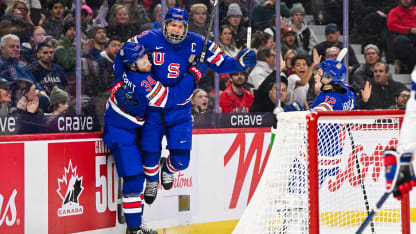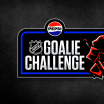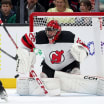The NHL Network will air every game of the 2025 IIHF World Junior Championship in Ottawa. It includes comprehensive coverage of the United States National Junior Team, which will play Finland in the championship at Canadian Tire Centre on Sunday (7:30 p.m. ET). In the semifinal round Saturday, the United States defeated Czechia 4-1 and Finland defeated Sweden 4-3 in overtime.
NHL Network's E.J. Hradek will handle play-by-play with former NHL forward Tony Granato offering color commentary. Mike Kelly and Jon Morosi also will be part of the coverage, and longtime NCAA hockey analyst Dave Starman will provide in-studio analysis and give his three keys to victory for the United States before each of its games during the 11-day tournament.
"I give the United States a ton of credit ...," Starman said. "I thought Czechia matched up pretty well with the U.S. but the biggest difference, and we said it on the NHL Network studio shows, was the U.S. speed. It has been the X-factor in every game. No team has taken a play that had no form and turned it into a goal or chance like the U.S. has and their speed has been a big reason. Attacking downhill in fifth gear makes a lot of players, especially 18-to-19-year-old defensemen, make mistakes.
"In 2019, the U.S. and Finland played a very entertaining 'fight for every inch' type of game that Kaapo Kakko won for the Finns in Vancouver in the final two minutes. Finland just plays no frills, good skill, hard-skill-hockey. After an emotional win against geographical rival Sweden, they play their biggest rival, the U.S., for gold. Games between these two usually are awesome to watch and the Finns look at the U.S. as their team to beat every year. Finland matches up well, but this game comes down to the old adage of 'The team that gets off the bus with the best players usually wins.' That team is the United States."
Here are Starman's 3 keys to victory for the United States against Finland:
1. Dominate on the forecheck
"With all the highlight-reel goals getting scored, overlooked is how the ground game has made a difference. The ability to defend starting up ice, combined with how fast the U.S. has gotten to people and pucks, has made a lot of teams have to go 200 feet too often through a disciplined structure of defending. The Finns are a physical team but don't score a ton. Making them work for every chance (and probably limiting quite a few) using their speed and tenacity off the puck is a huge asset for Team USA."
2. Goalie goodness
"Following along at home, you've read about how there was no goaltending controversy with the United States. Trey Augustine was their starter and they were getting him ready for their two biggest games. Those tea leaves were easy to read. He came in off a bit of a layoff and it took 2-3 games to get the battle level up to where it had to be. Once the Canada game arrived, Augustine's 'game on' switch flipped and he has been the rock they have needed since. His last two games against Canada and Czechia have been incredibly solid. He looks fresh mentally and physically. If the game against Finland for gold is the-first-to-three-goals-wins, I'd expect the under allowed by Augustine."
3. Balancing act
"The U.S. has 33 goals. The number that has come off the rush versus the number off offensive zone plays is about equal, and they have nine power-play goals. They drive wide, they enter middle lane and can kick wide or create off that initial entry. And they can cycle and recover pucks. The last 23 goals were scored on first shots and that's unheard of and a testament to how good they have been creating high-danger chances. The skill level has allowed them to play with possession in all three zones and their line balance has allowed them to spread minutes and keep everyone involved. This is a group built to win seven games. Their makeup is speed, skill, attack. Building a short-tourney team versus a long-haul team are two very different animals and the 2025 version is what a short-tourney team looks like."


















